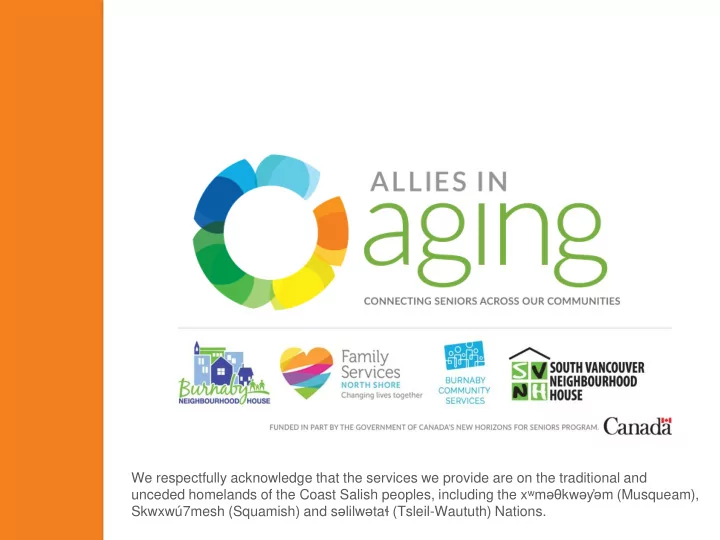

We respectfully acknowledge that the services we provide are on the traditional and unceded homelands of the Coast Salish peoples, including the x ʷ m əθ kw ə y ̓ə m (Musqueam), Skwxwú7mesh (Squamish) and s ə lilw ə ta ɬ (Tsleil-Waututh) Nations.
Allies in Aging: Volunteer Impact
GoToWebinar participant control panel
• Bullet Connecting Older Adults: Exploring Risk Factors
Objectives of today ’ s presentation Objectives of today’s presentation • Learn why social connection is so important. • Recognize key risk factors for social isolation. • Identify ways to connect older adults with people and resources.
What does this mean for you as a volunteer or service provider?
Connection “ Being connected to others socially is crucial to both well-being and survival, yet an increasing number of older adults regularly experience social isolation. ” Juliana Holt-Lunstad, April 27, 2017
What does it feel like to be old and alone?
Social isolation: Having little or no contact with other people.
Loneliness: Loneliness: A feeling of dissatisfaction as a result of being alone or feeling disconnected from others.
Risk Factors for Social Isolation 1. Life Transitions 2. Low Income 3. Physical Health Challenges 4. Mental Health Challenges 5. Language or Cultural Barriers 6. Family Caregiving
Life transitions 1 Many older adults and their families are not adequately prepared for stresses that accompany aging.
Provide Support through Life Transitions: • Help ensure that they are safe and capable of managing on their own. • Help them find the assistance they need and build their circle of support. • Help them learn new tasks when needed. • Call and visit when possible. • Let them talk even if they become emotional. Expressing feelings is important to the grieving process.
Low Income 2 15% of seniors 65+ in Metro Vancouver live in poverty
Low Income & Seniors ’ Benefits Income tax must be filed to receive the following benefits: • PharmaCare • Guaranteed Income Supplement (GIS) • BC Bus Pass • Shelter Aid for Elderly Renters (SAFER) See AlliesinAging.ca for Fact Sheet on Low Income & Social Isolation
Physical 3 Physical Health Challenges Health Challenges • Older adults can experience social isolation and loneliness as the result of changes in physical health. • Up to 25% of the elderly who fall and break a leg in the western world, die.
Enhancing Physical Health • Walk • Swim or water walk • Dance! • Chair exercises • Check out your Community Seniors Guide for activities and transportation options. See AlliesinAging.ca for Fact Sheet on Physical Health & Social Isolation
Mental 4 Health Challenges One in four adults 65+ live with anxiety, depression, or other mental illness.
Supporting Seniors’ Mental Health Encourage seniors to: • Stay connected. • Keep your mind active. • Take care of your health. • Be physically active. • Eat healthy foods. See AlliesinAging.ca for Fact Sheet on Mental Health & Social Isolation.
Language 5 or Cultural Barriers 15% of seniors in Metro Vancouver are unable to speak English or French
Supporting Seniors through Language or Cultural Barriers • Familiarize yourself with cultural resources in your community. • Be open to hearing the person ’ s story. • Connect with a Settlement Worker for support in first language. See AlliesinAging.ca for Fact Sheet on Linguistic & Cultural Barriers
Family 6 Caregiving 1,000,000+ people provide unpaid care for adult family members and friends in BC
Family Caregiver Support • Call Family Caregivers of British Columbia 1-877-520-3267 (weekdays 8:30am to 4pm) • Check out the United Way Caregivers Handbook • Find support by searching online for Caregiver support in your community, e.g.: – Caregiver support groups Burnaby – Resources for Caregivers North Vancouver See AlliesinAging.ca for Fact Sheet on Staying Connected While Caring for Another
How might one’s health and lifestyle benefit as a result of having strong social connections?
Health & Lifestyle Benefits of Social Connections: • Better sleep • Reduced blood pressure • Improved immunity • Reduced levels of depression • Improved level of activity and exercise • Reduced risk of illness and death • Less alcohol consumption • Decreased risk of falling • Fewer hospital visits • Decreased risk of abuse • Better nutrition
Factors that Support Social Connection Feeling Social Access to Satisfying Sufficient Good connected support Transportation health relationships income health & valued network services Skills/ resources Meaningful Continuous Safe Secure to find roles learning neighbourhood housing needed support
The importance of Social Connections
• Bullet Questions?
For more information: Thank you www.alliesinaging.ca
Recommend
More recommend